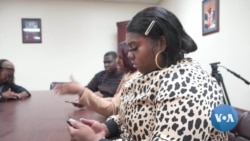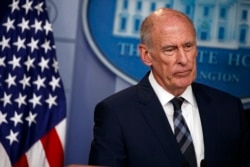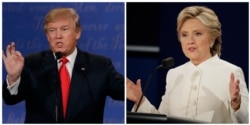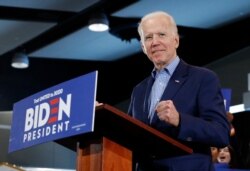With heads tilted down over smartphones, a group of African American students swiped through their social media accounts. On this particular day, these young South Carolina voters search for information about the 2020 U.S. presidential election and the candidates in the race.
“When I look for information about the presidential campaigns, I go to my social media news feeds on Twitter, Facebook and Instagram,” said Monique Daniel, a senior at South Carolina State University in Orangeburg.
Daniel, like others on this predominantly black college campus, hasn’t decided whom to support in the state’s upcoming Democratic presidential primary Feb. 29.
Increasingly, the students say they ignore the endless campaign ads blanketing the television airwaves and turn to social media for information on which to judge candidates.
African Americans targeted
A study by the Nielsen ratings service revealed African Americans were among the nation’s top consumers of social media, especially when it came to presidential politics.
The strong engagement made the minority group the target of a Russian disinformation campaign in 2016, a fact that a U.S. Senate Intelligence Committee report confirmed last year. The report concluded that Russian influencers targeted African Americans on social media more than any other group during the 2016 presidential campaign.
Its goal was to influence the U.S. presidential election between Hillary Clinton and Donald Trump. Now, Facebook is trying to guard against foreign interference after the social media giant revealed last October a Russia-based operation that targeted several Democratic presidential campaigns. It was the first known attempt to interfere directly in the 2020 contest.
Last week, reports surfaced that senior U.S. intelligence officials told American lawmakers that Russia has been interfering in the 2020 U.S. presidential contest.
“In broad respects, social media plays that role in reinforcing individuals’ sort of preexisting views,” said Todd Shaw, a political science professor at the University of South Carolina. “I think it has that effect also on black America. It becomes not just an echo chamber, but black social media serves as a forum for community discourse and discussion. There are concerns that social media could again be used to suppress the black vote.”
He added, “These bots or software applications that run automated tasks over the internet will play into existing concerns and stereotypes about the black vote being taken for granted.”
How the Russian propaganda campaign worked
“The Russians are going to do whatever is in their power to discourage people from voting,” said Ron Woods, 61. “And if you are not engaged and you are not informed, then your vote can be easily depressed.”
Woods said he saw Facebook content aimed to keep him and other African Americans from voting in 2016.
Another report by researchers at cybersecurity company New Knowledge and Columbia University said the misinformation campaign intended to reinforce tribalism, while sustaining efforts to erode trust in democracy itself. According to the report, that tactic “was substantially more pronounced” on accounts that targeted black social media users.
The report maintained Russian agents created domain names like “blackvswhite.info” and “blackmattersusa.com to exploit racial divisions and already existing tensions in the United States. The studies revealed Russia’s efforts were designed to help Trump win the election and harm Hillary Clinton’s campaign. However, no report found Russia’s efforts definitively led to Trump’s victory.
In February 2018, special counsel Robert Mueller indicted 13 Russian nationals who were members of the Internet Research Agency (IRA) with conspiracy to interfere in the 2016 presidential contest. U.S. investigators said the Russian company engaged in online influence operations on behalf of Russian businesses and political interests.
The IRA created videos for YouTube channels that discussed “Black Lives Matters,” the activist movement that campaigns against violence and systemic racism toward black people.
“2016 definitely raised a red flag, especially when we saw how the Russian government was manipulating the black vote specifically making false pages for advocacy groups like Black Lives Matter,” said Garrett McDaniel, 32, a campaign worker for Democratic presidential candidate Pete Buttigieg.
Battle against foreign attacks
Last October, Facebook revealed it found suspicious activity on its popular Instagram app that included posts targeting battleground state voters. The tech giant also said the social media posts attempted to create African American resentment of former Vice President Joe Biden and Massachusetts Sen. Elizabeth Warren.
Social media companies pledged new security measures aimed at finding and removing coordinated manipulation campaigns before they spread fake content.
“As soon as we find something that those fact-checking organizations rate false on our platforms, we dramatically reduce the distribution. And we put next to it related articles so anybody who shares that gets a warning that this has been rated false,” Monika Bickert, head of global policy for Facebook, said during a congressional hearing last year.
Security expects and lawmakers say foreign interference in the presidential campaigns illustrates the threats to the U.S. political system not only from Russia but also Iran and China.
Political analysts cited a greater awareness among black voters today to suspicious political social media posts.
“I believe there will be less political interference targeting African Americans on social media in the coming 2020 presidential election,” said Davion Petty, who worked with students at South Carolina State on how to decipher political information on social media.
“I am optimistic going forward. I think with the exposure of what happened in the 2016 presidential election, I don’t think we have to worry as much about foreign interference on social media in 2020 because it is under high scrutiny, under high watch,” he said.








